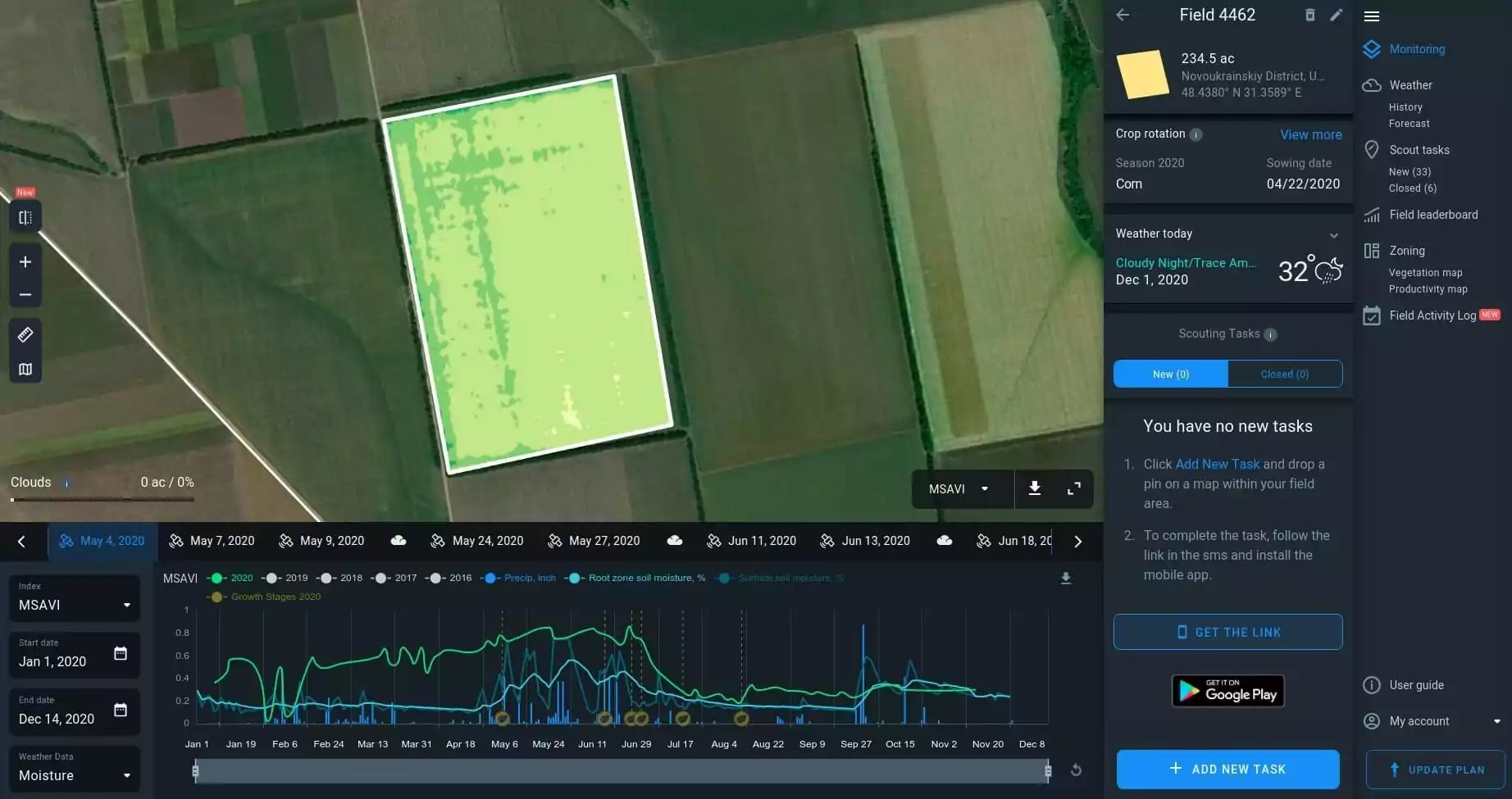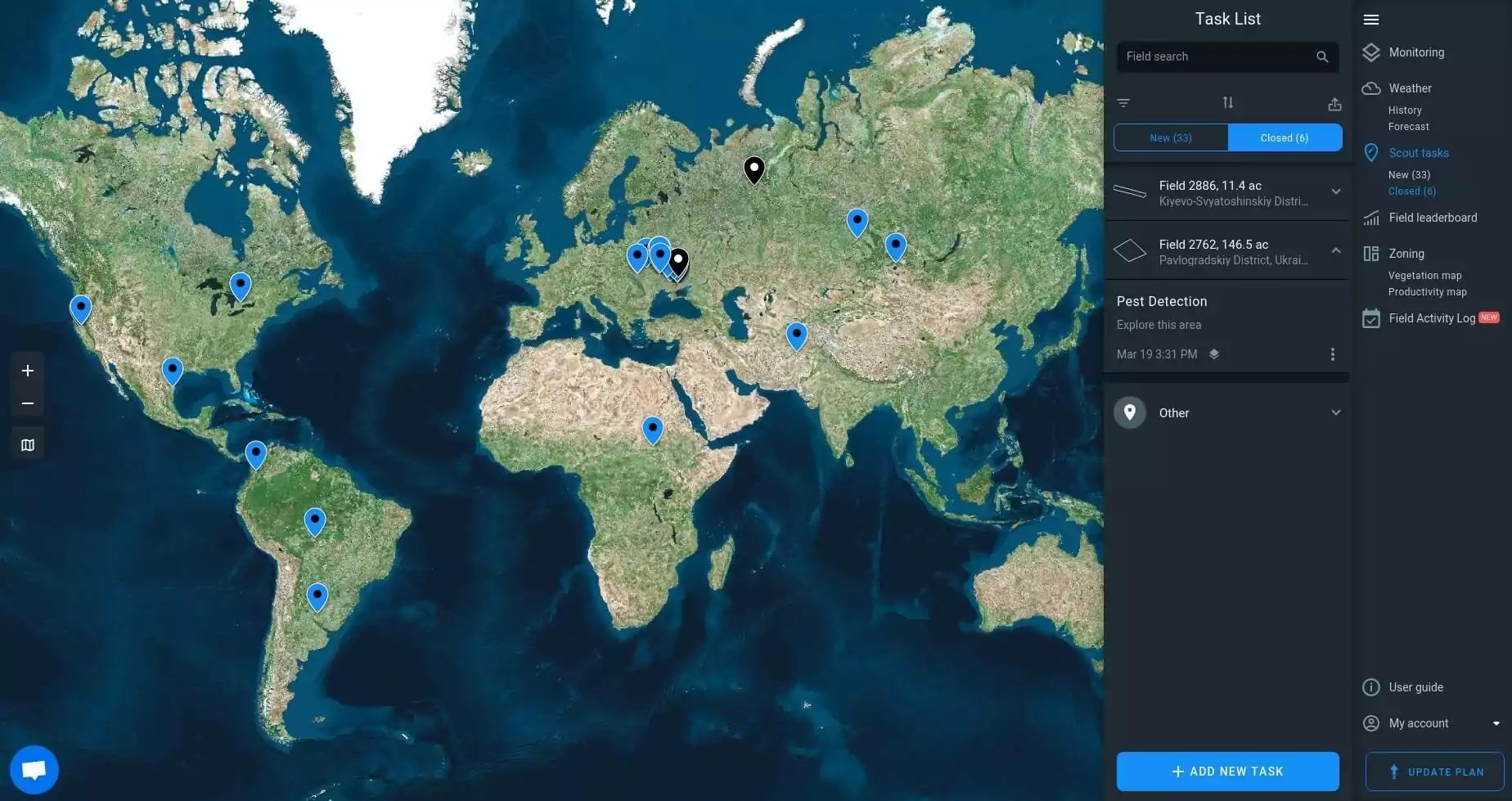
- Agricultural practices
Share to:
-
Link copied!
Intensive agriculture is the most typical method of soil cultivation and the key source of food worldwide. It relies on reaping high yields with strong and often extreme land exploitation and often extreme inputs. The main benefits of intensive farming include sufficient food supplies at affordable prices.
However, advantages never come for free. Increased chemical applications are dangerous both to nature and the human body. Intensive farming causes environment pollution and induces major health issues due to poisonous agents. In this regard, the impacts of industrial agriculture require serious attention and management of risks.
What Is Industrial Agriculture?
The concept of industrial agriculture implies increased use of farmlands to produce the highest yields possible to gain profit and support human food needs. The maximization is achieved through typical intensive farming practices like increased use of fertilizers, insecticides, abundant irrigation, heavy machinery land treatment, planting high-yield species, expansion of new areas, among others. This way, higher inputs in industrial agriculture condition higher outcomes.
Most commercial agricultural enterprises apply intensive crop farming and regard agriculture primarily as a business, taking as much as they can from every single unit of land. On the contrary, extensive farming propagates a more sparing and healthy approach to land use, with fewer chemical inputs. It maintains productivity in natural and eco-friendly ways that echo with organic farming.

Benefits Of Industrial Agriculture
The main advantage of intensive farming is its increased performance when higher yields are harvested from smaller territories. This brings economic benefits to landowners and provides food for the growing population. Intensive agriculture fully satisfies the market demand even in densely inhabited areas. It also requires less labor compared to eco-friendly farming methods since chemical pest and weed controls work faster and are easier to implement.
Disadvantages Of Industrial Agriculture
The highest crops come with some drawbacks though. Traditional intensive agriculture neither aligns with the sustainability concept nor contributes to nature protection, so intensive farming problems require serious consideration.
- Deforestation. Intensive farming causes soil degradation and leads to the expansion of new lands. In particular, forests are cut for the sake of new fertile and productive areas. The problem scope becomes clear with illustrative figures. Thus, modern industrial agriculture is to blame for 80% of global deforestationGabrielle Kissinger, Martin Herold, Veronique De Sy. Drivers of Deforestation and Forest Degradation. A Synthesis Report for REDD+ Policymakers..
- Pest and weed resistance to chemicals. Regular use of synthesized pesticides and herbicides in industrial agriculture induces adaptation when great and frequent amounts become less effective or ineffective at all. As a result, parasites become stronger and establish in multiplied numbers beyond any reasonable control.
- Soil degradation. “Squeezing” from fields as much as possible causes soil depletion and erosion. So, strong industrial agriculture practices make lands weaker as they significantly interfere with natural soil processes. In particular, chemical pesticides destroy earth-dwelling microorganisms that ensure composting and proper organic matter incorporation.
- Impact on natural habitats. The necessity of seeking new territories for industrial agriculture needs affects wildlife and deprives it of traditional living places.
- Water pollution. Heavy chemical runoffs from fields due to industrial agriculture penetrate water bodies, poisoning aquatic populations. Deforestation and cuts of buffer strips for riverbank fortifications cause floods and sedimentation.
- Climate change. Intensive agriculture practices are major drivers of global climate change speeding up soil erosion and environment pollution in general due to improper carbon sequestration, fossil fuel emissions, and exploitive approach to land and water use.
Human health impact. Extreme chemical quantities in consumed plants induce issues in the human body, including even congenital abnormalitiesKalliora, Charikleia et al. “Association of pesticide exposure with human congenital abnormalities.” Toxicology and applied pharmacology vol. 346 (2018): 58-75. doi:10.1016/j.taap.2018.03.025.

There are also economic and social disadvantages. Modern industrial agriculture employs extensive use of machines and technologies of field treatment and requires less human labor compared to eco-friendly practices with a lot of manual work. It results in low employment and engagement of human resources.
As to the economic side, low prices of traditional intensive agriculture make a serious competition to more expensive organic farming products, even though the quality of the latter certainly wins.
EOSDA Crop Monitoring
Performing fields analytics based on relevant satellite data to ensure effective decision-making!
try now
How Does Intensive Farming Reduce Biodiversity?
Industrial agriculture is certainly useful in terms of food security. However, its methods are far from beneficial to the environment. Shortened flora and fauna populations represent a significant disadvantage. It mainly happens due to agrochemical applications and monocropping practices.

Agrochemicals In Industrial Agriculture
Apart from the expansion of new territories when wildlife loses its natural habitation areas, animals are greatly affected by chemical applications in industrial agriculture. While herbicides pollute natural resources, pesticides are rarely selective and kill beneficial species as well, like pollinators and soil-dwelling microorganisms contributing to its fertility. Recent researches report decreased farmland bird and bee populationsElizabeth Grossman. Declining Bee Populations Pose a Threat to Global Agriculture. Yale School of the Environment due to heavy insecticides in industrial agriculture, being a significant threat to further farming business and ecology in general. Hormones mitigating crop diseases are another harmful issue of intensive farming.
The agrochemical effects of industrial agriculture conditioned serious governmental regulation worldwide via banningFurther restrictions on neonicotinoids agreed. Department for Environment, Food & Rural Affairs. gov.uk the most dangerous chemicals, especially those containing neonicotinoids.
Monocropping In Industrial Farming
Monocropping of high-yield species like rice, soybeans, corn, or wheat provokes high pest establishment and soil depletion. Particular pests attack particular crops; intercropped cultures act as barriers since they are non-host plants. Furthermore, reduced diversity of crops due to this fundamental industrial agriculture practice means better pest establishment and development of their resistance to controls applied. This results in extreme use of chemicals (often critical to humans and nature) and stronger option introductions.
Also, the same agro culture requires the same set of nutrients, and intercropping vs. industrial agriculture monocropping is beneficial in this regard as well since it helps farmers to balance soil fertility and address erosion.

Technologies In Intensive Agriculture
Innovations greatly facilitate agriculturalists’ efforts and save farmers’ costs. Precision farming is extremely helpful in industrial agriculture and is part of the business-as-usual practices of many enterprises nowadays.
Field monitoring with drones and satellites enable industrial agriculture landowners to grasp the situation in real time day and night while historical data for profound analysis is available on online agro platforms. Even the most remote farms can be inspected as the scale of internet connectivity expands. Locally, field sensors accurately report the state of things. For example, if you are growing almonds, trunk diameter sensors in these trees maysignal the urge for irrigation.Conejero, W. & Mellisho, C.D. & Ortuño, Maria Fernanda & Moriana, Alfonso & Moreno, Fiona & Torrecillas, Arturo. (2011). Using trunk diameter sensors for regulated deficit irrigation scheduling in early maturing peach trees. Environmental and Experimental Botany - ENVIRON EXP BOT. 71. 409-415. 10.1016/j.envexpbot.2011.02.014.. Another significant discovery for intensive agriculture is GPS providing the exact location data and thus enabling to distinguish separate areas.
Smartphone and tablet apps help agronomists inspect and manage farming operations, order supplies, schedule product sales, and track transportation from any place connected to the internet.
Achievements of electronics and robotics find their implementation in intensive farming as well, assisting in machinery control, mechanical and chemical weed and pest management, seeding and harvesting, etc.
Experiments of replacing sunlight with LED open new horizons to abandoned area use for agricultural needs, like attics, mines, former plants, or factories.
EOSDA Crop Monitoring To Help In Intensive Farming
Industrial agriculture implies heavy exploitation of land aiming to ensure sufficient food supplies. With all respect to nature, humankind cannot reject this practice completely. However, mitigation of risks and negative consequences is possible with smart solutions and precision agriculture, in particular.
Remote sensing and satellite data-based agricultural platforms are greatly helpful to industrial agriculture supporters, too. They enable farmers to reduce chemical allocations only to affected areas.
EOSDA Crop Monitoring is all-in-one farming software which allows more accurate and, thus, cost-effective decision-making to industrial agriculture practitioners. It provides credible information for everyday agricultural routine, including weather analytics, data on vegetation state, productivity, efficient distribution of resources, and overall field inspection.
Productivity maps let farmers compare historical data on a specific region to identify the most and the least productive areas for optimal seed distribution in intensive farming.

Field zoning splits the field into separate areas outlining critical spots for corresponding differentiated treatment when only damaged zones are handled instead of “blind” preemptive applications on the entire territory. This feature assists in reducing the side effects of industrial agriculture on the environment and saving cost inputs.

Vegetation indices data based on remote sensing allow scheduling field activities to improve the state of crops. The EOSDA Crop Monitoring app builds NDVI, MSAVI, ReCl, NDRE, NDMI curves and generates interactive maps for specific crops. Check the crops available for enhanced monitoring in your region at sales@eosda.com. Also, EOSDA Crop Monitoring elaborates Custom Projects upon request.

Scouting app. In case an issue is suspected, a farm owner can assign tasks to scouting experts via the designated app (that has a mobile version, too), specifying GPS data and describing the problem. Then, task completion can be monitored on the app from beginning to end. Thus, farmers can inspect vast industrial agriculture territories within a shorter period of time, letting the tool do the greater part of the issue detection job.

Weather analytics encompasses information on temperatures, humidity level, wind speed, cloudiness, precipitation as well as historical data for every five years from 2008 to present.

So, Is Industrial Agriculture Bad
Taking into consideration all the industrial farming drawbacks, ecological activists call for more responsible and sustainable farming solutions. However, the total switch from industrial agriculture to eco-friendly and regenerative alternatives will cause a reduction in food supplies. Besides, continuous compliance with organic farming standards is quite a challenge to farmers, and non-industrial applications require more costs, efforts, and time.
On the other hand, the adverse impacts of industrial agriculture can be considerably mitigated with precision farming technologies.
So, weighted decisions and governmental restrictive initiatives should balance decisions between the industrial agriculture possibilities to support hunger needs and ways to maintain the environment as healthy as possible for years to come.
About the author:
Vasyl Cherlinka Scientist at EOS Data Analytics
Vasyl Cherlinka is a Doctor of Biosciences specializing in pedology (soil science), with 30 years of experience in the field. He attended the engineering college in Ukraine and received his degree in agrochemistry, agronomy and soil science in the Chernivtsi National University. Since 2018, Dr. Cherlinka has been advising EOSDA on problems in soil science, agronomy, and agrochemistry.